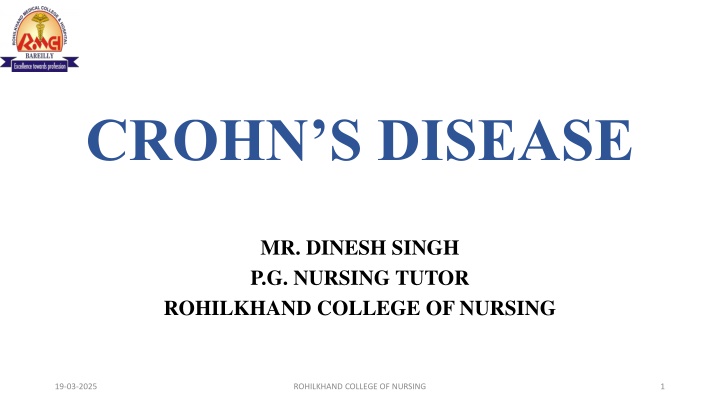
Crohn's Disease: Causes, Symptoms & Management
Crohn's disease is a chronic inflammatory bowel disease that affects the digestive tract, causing symptoms like abdominal pain, diarrhea, and weight loss. This article explores the definition, etiology, clinical manifestations, diagnostic evaluation, and management of Crohn's disease, providing insights into nursing management strategies for patients.
Download Presentation

Please find below an Image/Link to download the presentation.
The content on the website is provided AS IS for your information and personal use only. It may not be sold, licensed, or shared on other websites without obtaining consent from the author. If you encounter any issues during the download, it is possible that the publisher has removed the file from their server.
You are allowed to download the files provided on this website for personal or commercial use, subject to the condition that they are used lawfully. All files are the property of their respective owners.
The content on the website is provided AS IS for your information and personal use only. It may not be sold, licensed, or shared on other websites without obtaining consent from the author.
E N D
Presentation Transcript
CROHNS DISEASE MR. DINESH SINGH P.G. NURSING TUTOR ROHILKHAND COLLEGE OF NURSING 19-03-2025 ROHILKHAND COLLEGE OF NURSING 1
OBJECTIVES Introduction of the Peritonitis. Define the Peritonitis. Explain the causes of Peritonitis. State the clinical manifestations of Peritonitis. Elaborate the diagnostic evaluation of Peritonitis. Discuss the management of Peritonitis. Describe the prevention of Peritonitis. 19-03-2025 ROHILKHAND COLLEGE OF NURSING 2
INTRODUCTION Crohn's disease is a type of inflammatory bowel disease (IBD). It causes swelling of the tissues (inflammation) in your digestive tract, which can lead to abdominal pain, severe diarrhea, fatigue, weight loss and malnutrition. 19-03-2025 ROHILKHAND COLLEGE OF NURSING 3
DEFINITION It is an idiopathic, chronic, inflammatory process of the bowel that can affect any part of the gastro intestinal tract from the mouth to anus. 19-03-2025 ROHILKHAND COLLEGE OF NURSING 4
ETIOLOGY Genetic Autoimmune Smoking Microbes, Eg. Mycobacterium avium 19-03-2025 ROHILKHAND COLLEGE OF NURSING 5
CLINICAL MANIFESTATION Abdominal pain Diarrhea Bloating Perianal discomfort Ileitis result in large volume watery feces and colitis result smaller volume feces in higher frequency Weight loss due to malabsorption of carbohydrates, lipids. 19-03-2025 ROHILKHAND COLLEGE OF NURSING 6
DIAGNOSTIC EVALUATION A barium X-ray Colonoscopy CT scan Endoscopy Blood test (to detect ESR, C-reactive protein, haemoglobin) 19-03-2025 ROHILKHAND COLLEGE OF NURSING 7
MANAGEMENT Antibiotics used to reduce inflammation Corticosteroids- Prednisone, methyl prednisolone Immunomodulators- Azathioprine, methotreaxate 19-03-2025 ROHILKHAND COLLEGE OF NURSING 8
NURSING MANAGEMENT Fluid volume deficient related to diarrhea Imbalanced nutrition related to nausea, pain Chronic pain related to inflammatory disease of small intestine. 19-03-2025 ROHILKHAND COLLEGE OF NURSING 9
DIETARY MANAGEMENT Drink lot of fluids to keep body hydrated and prevent constipation Take multivitamin-mineral supplement to replace lost nutrients Eat a high fiber diet Take small frequent meals Eating a high protein diet with eats meats, fish and eggs may help relieve symptoms of crohn's disease. Avoid to take caffeine, alcohol Avoid gas producing food such as broccoli, cabbage, cauliflower, dried peas, onions and carbonated drinks. Reduced fat intake if part of intestines has been surgically removed. 19-03-2025 ROHILKHAND COLLEGE OF NURSING 10
SUMMARY 19-03-2025 ROHILKHAND COLLEGE OF NURSING 11
REFERENCES 19-03-2025 ROHILKHAND COLLEGE OF NURSING 12
19-03-2025 ROHILKHAND COLLEGE OF NURSING 13

